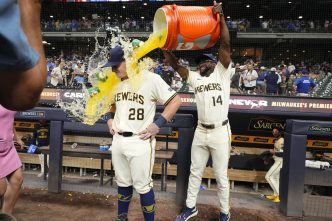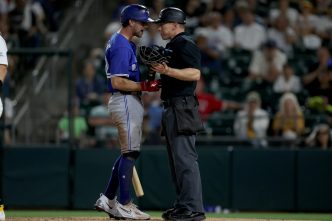In the heart of the Orioles’ clubhouse, Ben McDonald stood as a beacon of wisdom and experience, addressing a diverse group of players, ranging from fresh hopefuls to seasoned veterans. His message was simple yet profound: savor every moment on the baseball field because you never know when it might be your last. It struck a chord, echoing a truth every athlete eventually faces but many confront too late—the abrupt end of a sports career and the identity crisis that often follows.
The tragic story of Brian Matusz, a former Orioles pitcher, underscores this harsh reality. At just 37, Matusz’s life was cut short, reportedly due to a drug overdose, casting a somber light on the mental health struggles he faced after his baseball career faltered. Despite the shock of his passing, those close to him were aware of his battle with losing the game that once provided structure and purpose to his life—a struggle not uncommon among athletes.
Take Ben McDonald, for example, who faced a similar crisis when shoulder injuries forced him to retire at 29. The transition was anything but easy. He found himself grappling with bitterness, depression, and a strained family life. Yet, through therapy and the unwavering support of his wife, McDonald emerged with a new sense of purpose, channeling his energy into broadcasting and mentoring the next generation of players.
The challenge of identity loss isn’t isolated to baseball. Legends like Michael Phelps and Shaquille O’Neal have also spoken openly about their post-retirement struggles, highlighting a broader issue within the world of sports. The end of an athletic career can leave a gaping void, as athletes must fill the years typically spent training and competing with new pursuits and goals.
Michelle Pannor Silver, a scholar on retirement transitions, captures this sentiment in her work. She notes that athletes often face an identity crisis when they retire, their personal sense of self deeply intertwined with their sport. Unlike other careers, the life span of an athlete’s professional tenure is short, often leading to a profound sense of loss when it’s over.
For Matusz, his journey began as a promising talent, picked fourth overall in the 2008 draft. His early success in the majors was promising, but injuries soon shifted his role from starter to bullpen, a change he struggled to accept. Although the time and circumstances of his substance use remain unclear, concerns were raised by friends as early as 2014. Even amidst these challenges, Matusz clung to the hope of a comeback, yet the dream never materialized as lingering injuries and missed opportunities took their toll.
Stories from former teammates reveal a man who became increasingly isolated after leaving the game. Efforts by friends to engage him in new activities or move him towards a fresh start seemed to hit a wall, as Matusz appeared stuck in a cycle without direction. The sentiment of seclusion being fuel for his struggles was palpable among those who cared for him.
While Major League Baseball offers various programs to assist both current and retired players in life after sports—providing everything from addiction recovery support to career development workshops—the effectiveness of these programs in addressing the unique mental health needs post-retirement remains a crucial area for improvement.
Charlie Morton, reflecting on his own career decisions, emphasizes the need for timing in conversations about life after sports. Although active players need to focus on their current careers, having initiatives in place for when they finally step away is crucial.
There are programs under the Baseball Assistance Team and the Major League Baseball Players Alumni Association aimed at helping retired players transition smoothly. Yet, the death of Matusz serves as a stark reminder of the gaps that still exist—gaps that could mean the difference between finding a new path and falling into despair.
For those like Jerry Hairston Jr., a former Oriole turned MLBPAA board member, the mission is clear: ensure that retired players not only have the financial means but also the purpose and fulfillment needed to navigate the decades beyond their playing days. It’s about providing ideas and opportunities that spark productivity and meaning, regardless of the wealth accumulated during their careers.
As the baseball community reflects on Matusz’s life, there’s a growing recognition of the importance of staying connected, looking out for one another beyond the field. Caleb Joseph, a longtime friend and former roommate, admits there’s a collective questioning among those who knew Matusz well—what more could have been done?
In the end, Matusz’s story serves as a poignant reminder that the bonds formed in the heat of competition must extend into the quieter days that follow. For the Orioles’ close-knit group of former teammates, his passing has ignited an enduring commitment to remain present in each other’s lives—a powerful call to action that honors the memory of a teammate gone too soon.






